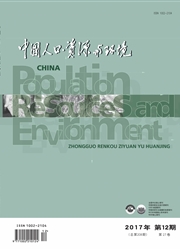

 中文摘要:
中文摘要:
回顾《联合国气候变化框架公约》下国际气候变化适应政策以及欧盟及其主要成员国、亚太地区主要发达国家、新兴经济体国家和最不发达国家气候变化适应政策的发展历程。并与我国应对气候变化相关政策的发展动态进行对比分析。总结可供我国借鉴的经验和做法。发现进入21世纪以来适应在国际应对气候变化行动中已经获得了与减缓同等的重要性。《联合国气候变化框架公约》下与气候变化适应相关的谈判议题已经从初期单纯关注资金及技术开发和转让机制发展到实施具体的适应计划和行动.主要发达国家和发展中国家2006年以来密集出台了一系列专门的或与气候变化适应相关的政策。包括法律、框架、战略、规划、行动方案等。最不发达国家也在《联合国气候变化框架公约》资金机制的支持下相继开展了《国家适应行动方案》和《国家适应规划》的编制工作。因此制定国家或区域层面的宏观政策以规划和指导气候变化适应行动已成为必然趋势。从2007年开始,我国陆续在国家、地区和部门层次上制定了与气候变化适应相关的政策,但是这些政策在表现形式、制定依据、战略定位、内容构成以及实施机制等方面还存在不足。包括缺乏专门的战略或规划、相关研究基础相对薄弱、政策的国际视野不足、政策落实的责任不明确、缺乏相应的监控和评估机制等。建议我国进一步加强气候变化预测、影响评估、脆弱性和风险评价技术研发.开展气候变化适应政策制定、影响评估和实施机制的方法学和技术研究,抓紧制定专门的气候变化适应战略或规划.并重视其国际视野和战略定位。
 英文摘要:
英文摘要:
This paper reviews the progress in climate change adaptation policies both under the United Nations Framework Convention on Climate Change (UNFCCC) and in major regions and countries, including the EU and its major member countries, the major developed countries in the Asia-Pacific region, the emerging economies and the least developed countries. The progress made in China is also reviewed and the gap is analyzed, and finally good international practices are proposed for China' s policy development. It is found that adaptation has been given the same priority as mitigation since the 21st century in climate change related actions. The topics related to adaptation in the international climate change negotiations under UNFCCC have evolved from mechanisms for finance and technology development and transfer exclusively in early stages to implementation of practical adaptation programs and actions. Major developed and developing countries have frequently developed specific climate change adaptation policies or general climate change policies involving adaptation since 2006 in the form of laws, frameworks, strategies, plans and action plans. The least developed countries have also been working on National Adaptation Programmes of Action and subsequent National Adaptation Plans with the support from the financial mechanism under UNFCCC. Therefore it has globally become a common practice to develop national or regional policies to plan and guide climate change adaptation actions. China has established climate change policies involving adaptation at the national, regional and seetoral levels since 2007. However, these policies have strong limitations in their forms, knowledge base, strategic positioning, contents, and implementation mechanisms, e.g. lack of a specific strategy or plan, sound knowledge base, an international perspective, clear responsibilities for policy implementation, and appropriate monitoring and evaluation mechanisms. It is recommended that China should further strengthen its technical capabiliti
 同期刊论文项目
同期刊论文项目
 同项目期刊论文
同项目期刊论文
 期刊信息
期刊信息
